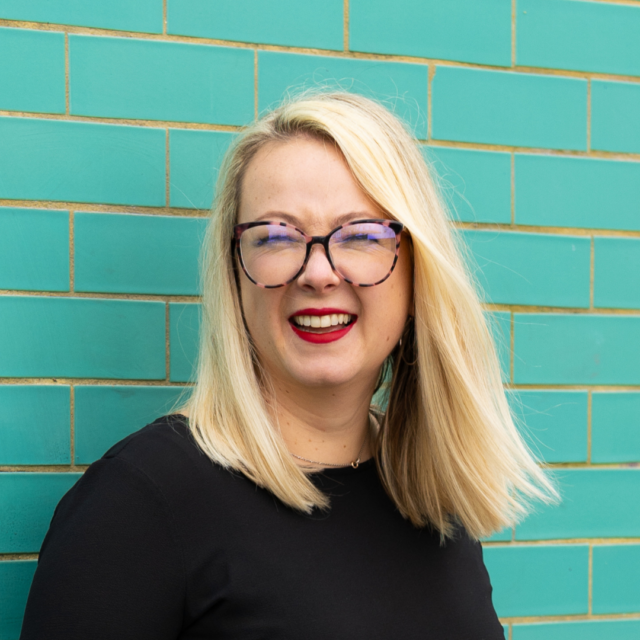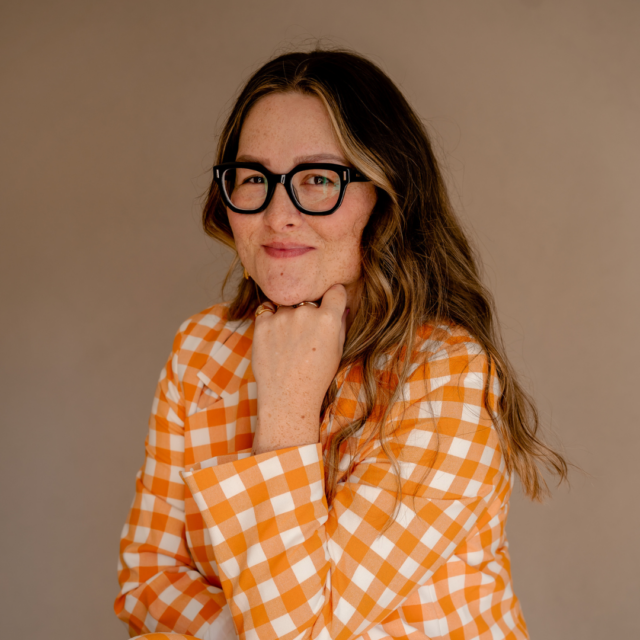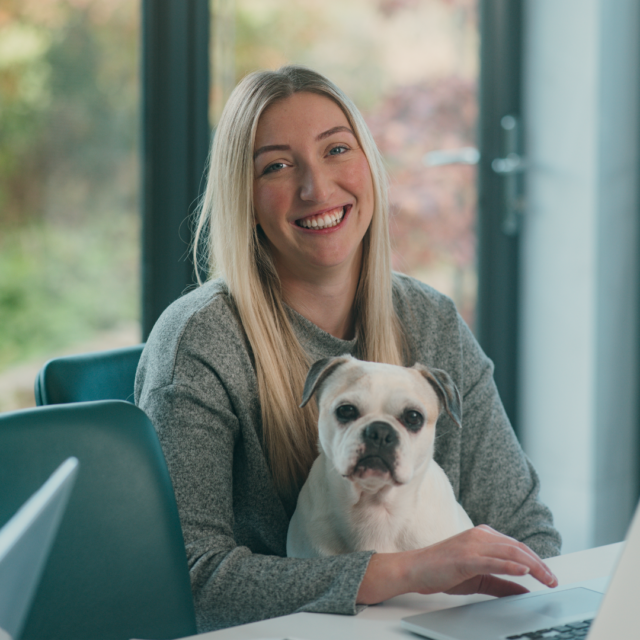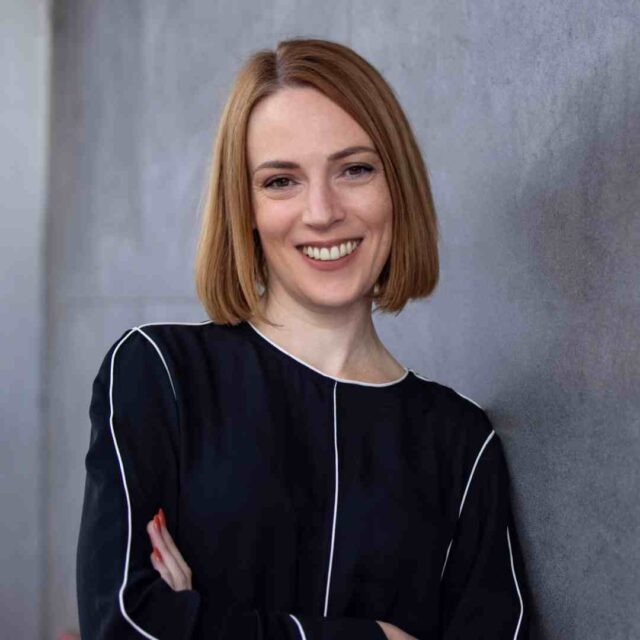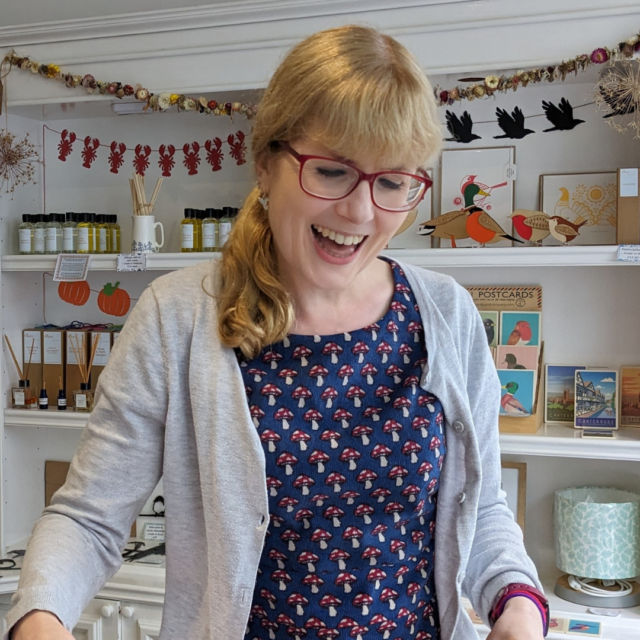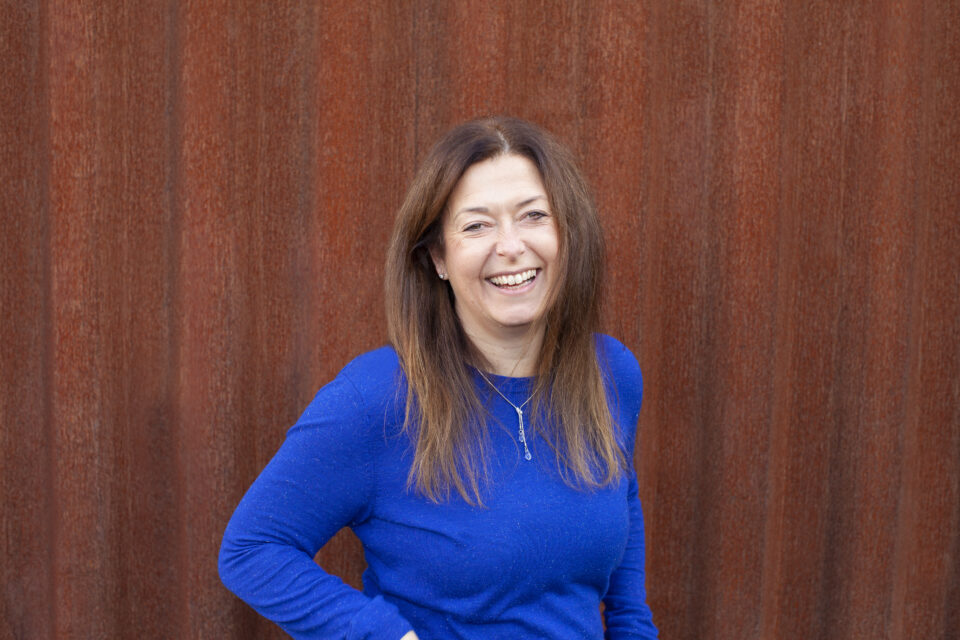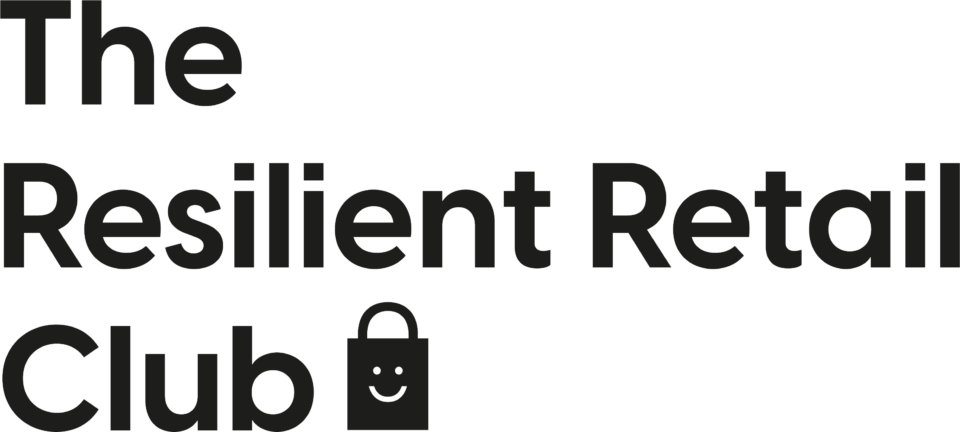Finding Purpose In Your Brand with Jo Tuchener-Sharp Founder of Scamp & Dude
Catherine Erdly: What is the purpose in your business? That’s the question I’m going to be exploring today with an interview with the founder of Scamp and Dude, Jo Tuchener-Sharp. This interview was originally broadcast as part of the Retail ROAR summit that I put out in February and it was by far one of the talks that had the biggest reaction.
People really enjoyed hearing Jo’s story and it is quite a moving story and just a really interesting insight into the purpose that she has behind building her brand. It was certainly very moving for me as the interviewer and I really hope that you’ll enjoy hearing Jo’s story and what led her to build the brand that she has today.
Welcome to the Resilient Retail Game Plan, a podcast for anyone wanting to start, grow or scale a profitable creative product business with me, Catherine Erdly. The Resilient Retail Game Plan is a podcast dedicated to one thing, breaking down the concepts and tools that I’ve gathered from 20 years in the retail industry.
and showing you how you can use them in your business. This is the real nuts and bolts of running a successful product business, broken down in an easy, accessible way. This is not a podcast about learning how to make your business look good. It’s the tools and techniques that will make you and your business feel good.
Confidently plan, launch and manage your products and feel in control of your sales numbers and cashflow to help you build a resilient retail business.
Meet Jo Tuchener-Sharp: Founder of Scamp and Dude
Catherine Erdly: Hi Jo, welcome to Retail ROAR. Thank you so much for joining us. I can’t wait to jump in today. Do you want to start off by introducing yourself and Scamp and Dude?
Jo Tutchener-Sharp: Yes. So I am Jo Tuchener-Sharp, and I’m the founder of Scamp and Dude. So Scamp and Dude is a purpose led fashion brand. We’re trying to transform the world of fashion into a force for good.
So there’s a lot more to us than just cool clothes.
Catherine Erdly: But there are very cool clothes too, of course. And
Jo Tutchener-Sharp: nice clothes too, yes.
Catherine Erdly: And do you want to start, because it’s a really very personal story how you started. Do you want to share, if anyone’s not familiar with how you got going what was the sort of impetus behind Scamper Dude?
The Life-Changing Event That Started Scamp & Dude
Jo Tutchener-Sharp: Yes, so my background was PR, so I spent my whole career working in PR, had a great time set up my own PR company, which I ran for eight years. And then I suddenly became very poorly. So I had a very bad headache and went to the doctors. They sent me straight to the hospital. And to cut a long story short, I’d had a brain hemorrhage, and they discovered a lump on my brain and my kids were only one and three at the time. So total life changing event, because firstly, I was just so worried about leaving them without a mum. And obviously, secondly, just when you’re facing the fact that your life might be about to end you look totally look back over your life and look at if you’re happy with everything you’ve done and how you’ve lived it. And I found myself with this horrible sinking feeling in my tummy that I hadn’t done enough good. And I just thought, what’s my legacy? What have I done? I’ve run a PR company.
I’ve had a great time, but I haven’t changed anything. I haven’t made the world better for anybody. That was a horrible feeling that it might be too late to make that change. And I didn’t know until that moment that was so important to me. So I was facing brain surgery to remove the lump and obviously, going to brain surgery is terrifying.
You don’t know if you’ll come out and if you’ll come out, it’s the same as you go in. And it was really terrifying. And I made a pact to myself that if I came out, whatever I did next was going to be helping people and doing something that made a difference. I didn’t know what at that point. So luckily I came out of the surgery.
So happy. It’s like literally one of the most, I’ll never forget that, that feeling of waking up and being like, Oh my God, I’m alive. Oh my God. I was so happy and I’m in intensive care with loads of other people who have all had brain surgery as well and just so happy like just an amazing feeling and then I had 10 days away from my kids because I had this side of my head shaved 20 staples down my head looked like Frankenstein and didn’t want them to have that vision of me stuck in their minds that like I said they were one and three it would have been really scary. So I had 10 days away from them while I was recovering and I spent a lot of time thinking what do I wish had been available to comfort them while we were apart?
And I came up with, I thought, but I wish I could have given them a little snuggly superhero. And if I had a pocket on the back, I could have put my photo and I could have said, mommy’s still there with you. Brilliant. And then I thought why don’t I make them?
And if I make them, I could donate one to a child who loses a parent for every one sold. So then I’m quite excited about this thought. Didn’t think of it as a business idea, just thought this could be my get well goal. This could be me doing some good, helping some children who are in a similar situation.
So that was the very start. So that was January 2016. And then I registered the name Scamp and Dude in the March. So Coming out of hospital, it was ticking over in my mind and I thought I could do a clothing line as well, a superpower infused clothing line to fill kids with courage and strength when they have to be away from their loved ones.
So whether that’s just going to nursery or school or anytime, and I came up with the superpower button which you can see here. And the original idea for it was to be pressed for superpowers for kids. So it’s a fun idea and something to give them some courage and strength and I know it helps kids who are going to school or nursery, it’s press that, press it.
And also another little trick for parents, what people have done in the past, they’ve worn their Scamp & Dude jumper or dress to drop off. And said, you press this. If you miss me, press it and I’ll feel it and I’ll send a hug back. And that’s worked really well with kids. That’s how it started off. So I designed a clothing line to go with it as well.
Super power infused leopard and animal prints. So all of our animal prints have little lightning bolts in amongst them, which is our signature look. So then we launched into Liberty in London in the November of that same year.
Catherine Erdly: Oh, wow.
Jo Tutchener-Sharp: I would say never underestimate the fire in your belly.
When you get a second chance at life, you are like, I can do anything. And also I want to do it now. And I literally worked my socks off and yeah, we launched into Liberty. I did, there was some adult sweatshirts because as I was making them, I was going, Oh my God, I love this. I want to wear it. So I was doing bigger sizes and Liberty took them too, even though it was in the kids department.
And then when we launched, they were the products that were just selling out. Like Liberty was just straight on the phone. Like literally the next day going, we’ve sold out of all the women’s ones. Get me more women’s pods on our website to gone. And I’d be ordering more and I could not get me or having waiting lists.
And so then over the years. So we turned seven in November. We’ve basically turned into a women’s wear brand with a smaller kids collection. So 95 percent of our collection and sales now are women’s wear and dresses outerwear. We’ve got denim collection and super scarves.
Charitable Initiatives: Super Scarves and Sleep Buddies
Jo Tutchener-Sharp: So I launched a collection of scarves as well with the same kind of mechanic as the superhero sleep buddies.
I wanted to be able to give women having a really hard time something as well. And the reason I chose scarves is when I was in hospital, I had a scarf from home that I would just wrap myself up in this, like a comfort blanket. And I found it so comforting. You’re in a hospital gown, you’re in a hospital room.
Something from home was just lovely. So I thought, I want to make a scarf so that for every one sold, we can donate another one to a woman with cancer. So we donate one of these now. There’s so many different designs and colors, but for every one sold, we donate another to a woman starting chemotherapy. So we’ve now donated over 40, 000 of these, which is incredible.
We’re trying to reach every single woman starting chemo, which each year is about 63,000. We’re trying to link with every single chemo ward across the UK. We’re linked with about 250. I’m getting all the hospitals put up on the website so it’s easier for people to go on and see if we are already linked with their local hospital or any hospital one of their loved ones is being treated at. So that they can help introduce us to others so we can try and reach every single one
Catherine Erdly: Yeah
Jo Tutchener-Sharp: I feel really strongly about this like it’s Women going in start chemotherapy.
It’s so terrifying. They feel so alone. They’re so scared of what’s to come and being handed a super soft scarf. And they’re always told this is full of superpowers. This is superpower abuse up in it, cuddle up in it. And it’s like being given a hug from somebody. And they also know that we’re thinking of them.
Like it’s just that thing of someone’s thinking they’ve sent you this scarf. One of the most, bits of the brand, actually the super scarves. And we’ve not had the super scarves for that long, but it’s, yeah, it means so much to the people that receive it. And it means so much to us that we’re actually helping those women as well.
Catherine Erdly: Yeah, that’s, all of the story is just incredible, but I, and I love the, how it is. It’s so at odds at what we tend to think of when we think of fashion, we think of it very image based. We think of it as very well for many years, exclusionary. And I, I worked in women’s clothing for many years and it was a kind of hard and hostile place at times.
So it’s so lovely that everything that you’re talking about is, coming from, as you call it, purpose beyond profit. So those are the key initiatives. Then you’ve got the super scarves and the superhero sleep buddies.
Jo Tutchener-Sharp: So they’re the charity items. We’ve also got a collection of makeup bags and cosmetic bags at the moment that have all been designed by really well known beauty experts like Caroline Hirons, Sally Hughes, Sam Chapman a whole range of people who’ve designed these bags for a specific charity of their choice.
So we’ve got Parkinson’s UK, Diabetes UK, Refuge, Beautybanks. So that’s We just, we love to do things that We can help people with, we have a whole collection of clothing as well. That aren’t the charitable items, like the dresses and the outerwear as well. Because the scarves, we don’t make any profit with the scarves or the sleep buddies.
The profit goes to the other one being made to be donated. And I’ve talked on panels before with big CEOs of huge corporations and they put a hand up and ask how is that a business? If you’re giving away, like you’re not making profit, how are you giving away? And I’m like, It doesn’t all have to be about profit.
Like these, this is one part of the business and I don’t mind. This is going to help me next time. Next time I’m at those pearly gates and I’m looking back over my life, this is going to help me because I’m going to go, I helped a lot of people in a little way. But I did help a lot of people, so actually I’m okay now, I can go, knowing that I’ve done some good rather than last time when I was like, Oh God, I don’t think I’ve helped enough people.
So yeah, it’s not all about profit and making money. That’s an important thing.
Catherine Erdly: What a question to ask. It doesn’t surprise me at all. Nothing I hear about big CEOs, big retailers ever surprises me, to be honest, because I’ve seen it. I’ve seen a lot, but I think that, also, I think what big retailers, often miss and what small, smaller or SME retailers really grasp is this concept of connection, right?
The fact that you do that for people without making that like a money spinner to have a charitable element of what you do, that is what helps them connect to the brand in a much deeper way. Yeah, then they would do if it’s if it is just purely about lining. Let’s face it.
It’s not even about profits about profit for a very small number of people usually isn’t it?
Jo Tutchener-Sharp: Yeah. Excatly. And I also think it’s about authenticity. We never pretend to be what we’re not. We are very real and very I never want us to become that kind of pretentious some sides of fashion can be quite pretentious and quite like you touched on before it’s not inclusive and it’s not it’s, if you look a certain way you can wear these clothes and if you’ve got a certain lifestyle you can wear them, we’re not about that at all, I mean our clothes go from size 6 to 22, like we try and cater for as many people as we possibly can.
Everything about our clothes is that they are super flattering. I’m the fit model. So they’re fit to me rather than normal little model who’s straight up, straight down. I’ve got curves, I’ve got big bottom and boobs. And so it’s, things are fit to make them more flattering for more people. So that’s really important to me as well.
Catherine Erdly: And just going back to, it just struck me. So you’ve come from background in PR and you have this moment where you’re like, okay, I’m going to do this. When you look back on that year, w as it just the most massive learning curve? Because to go from sort of idea to being in liberties, and you casually dropped it and you designed it, that’s a hugely technical thing to do, right?
Jo Tutchener-Sharp: It was a massive learning curve. But I don’t, you feel that when you, as you get older, you really want to learn, like you thrive on learning. And I think maybe before my surgery, I would have, maybe I would have seen barriers a little bit more and thought, my God, there’s no way I can design a collection.
But when I had that second chance at life, I suddenly saw no barriers and thought, Oh my God, I can do anything. I can do anything. I will learn, I will find a way. And I did just learn along the way. I listened to so many podcasts, read loads of books, so much research online, and I learned how to do it.
Designing the clothes, because it was kids wear, it was a lot easier than women’s wear. I mean, I think designing a dress, I would have bottled that, definitely. But when it was just kids, joggers, leggings sweatshirts, had a few different sweatshirt shapes and t shirt shapes, long sleeved t shirts.
That was easier than if it was a women’s wear brand and the women’s sweatshirts were just bigger versions of, and it was even going back and forth with the factory about changes that I didn’t have any of the lingo. So I’d be going the bingo we wing bit here. Like I think about maybe a centimeter and they were, you could imagine them going, Oh my God.
They loved the concept of the brand and what we wanted. What I was trying to do and they knew it was just me. Like I didn’t have anyone helping me. So I think they found it quite endearing, but they helped me. And I think that’s quite good. When you’re starting out, people do can take you under their wing a little bit more because they feel probably felt a bit sorry for me. They probably thought, what on earth is this woman doing? I was going to the factories and I still had this big like shave patch here and scar. And I’m there running around the factories and going, and they’re going, do you need to sit down? I was like no, it’s fine.
Let’s do this. And they’re like, crazy lady.
Catherine Erdly: Wow. That’s amazing.
Jo Tutchener-Sharp: But it was an amazing year. I did, my body kept stopping me and giving me migraines to make me stop because I shouldn’t have been working like that. And also I had two tiny kids as well. So it was a bonkers year. Bonkers.
And actually every year since has been equally as bonkers because as you grow, you’ve got other things. I’m still learning all the time. I learned something new. Literally all the time, just on a course the Goldman Sachs, 10, 000 small business course, which I started in September and finished December.
I don’t know what I was thinking doing it the busiest time of the year, but absolutely fantastic because I learned so much and having that time to stop is when you’re here, when I’m in the office and it’s just, you’re just literally running to keep up with everything we’ve been growing so quickly every year since we started that you don’t get time to stop and really think. And when it comes to the strategy for the business you’ve got to stop. You’ve got to have time to think. And that course was absolutely brilliant for that. And like I said, I love learning so much. So it was like, I was in heaven. These are like.
Oxford University lecturers. There was lecturers from Harvard and I’m sitting there just Oh my goodness! That’s amazing!
It was brilliant.
Catherine Erdly: What a fantastic opportunity. That’s amazing.
Becoming a B Corp: The Journey and Impact
Catherine Erdly: So you recently became a B Corp. Which is very exciting. So what’s your I guess it fits really well with your idea of your, your purpose to be on profit but what kind of gave you the push to, to go for it?
And how’s the process been?
Jo Tutchener-Sharp: So I think that I’d always wanted to do, to become B Corp cause I knew from the start of Scamp and Dude, I’d made sure everything I was doing was ethical. That was hugely important from the start, but also I was doing everything as sustainably as I can. And I’ve never really shouted about either of those things because I feel like it’s a given course. Every, anyone that starts a brand should be doing it ethically and as sustainably as they can. And then you see other brands going, we are sustainable brand and it’s all about staying and you’re like, and when we got our B Cup score, we like such a bigger score than them.
And I was thinking, Oh, we don’t even talk about it, but I was talking about the fact that we are. ethical and we do these good things. But it, I feel like it’s just something we needed to do because I know we were doing those things. So it was right that we had that badge of honor that yes, we are, we don’t just talk the talk.
We actually do the do as well. And my husband decided to close his business and come into Scamp and Dude as well. And that was a turning point for me because I thought he could, this can be one of the things that he can oversee because for me, I had no capacity. So there’s a few things I was looking at and going, I’d love to open more stores and I’d love to become B Corp, but I don’t have the capacity to do either of those things.
But they’re really big things that, I can’t just pass on to members of the team to do. And that’s when my husband was saying, I think I’m thinking of closing the business. And would you have me if I came into Scamp & Dude? And I was like yes, you could do B Corp and you can do the retail rollout. So he came in, took control of it.
And actually he was the one that managed the whole process.
It was easy, everyone would be doing it, but it takes, it took about a year and they literally look at every single part of your business, all the processes, all the systems, how you treat your staff, how every single factory, every single, part of the supply chain. Like it’s so detailed. And like I said, it took about a year.
But it’s so worthwhile. And also you come out of it having perfected quite a lot of processes as well, knowing how things they were asking for, you think, Oh, we don’t actually have a process for that. So let’s put one in place. And every year we will get marked by them again. So it’s like a little kind of internal challenge to better our score each year.
So we’re like, okay we know this is where we’re at now and we’ve got an amazing score. I’m so proud of the score we got, but now it’s we know what things we can do to get them better for next year because we didn’t have a proper process for this. And yes, let’s get some more benefits for the staff.
So we’ve put in like a wellness program now for the staff. We’ve got like fitness going on for them and all sorts of, Nice things that you can, so it’s actually great for the business as a whole as well to go through that process.
Catherine Erdly: And it must be a good feeling as well to know that you’ve, as you said, you’ve ticked all the boxes.
Because actually, I think as well for Fashionist it’s very rigorous because you have to, you’ve gotta jump through a lot of hoops and prove a lot of things.
Jo Tutchener-Sharp: Yeah.
Catherine Erdly: And really relies on the strength of your partners as well, your manufacturing partners, and
Jo Tutchener-Sharp: Yeah.
Catherine Erdly: And getting the information from them as well.
So I’m sure it’s. It’s a good feeling to know that you’ve got through it and got through it, with flying colors.
Jo Tutchener-Sharp: Yeah. And I think it’s also, it’s one of those things as the business has been changing every year, we’re growing up every year, we’re changing and now I feel like we’re a proper business.
We’ve always been a proper business, but at the beginning, it was me. Just flying by the seat of my pants. And then you’re suddenly growing and you’re getting bigger and you’re thinking, Oh my God, I’m still running this business. Am I capable of this? And this is what this Goldman Sachs course did for me.
Did you come out of it with a three year business plan? And I felt. I came out of that course going, yes, I’m totally capable of running this business. I went into it going, am I really capable of running this for the next three years? As we keep getting bigger and bigger. And I came out of it going, no, I am capable.
I know what I’m doing. This is fine. Because I think there’s always that kind of imposter syndrome when I don’t look or sound like a normal CEO of a business, but I am very much what you see is what you get, very authentic. I don’t have all the business lingo, but I know how to run my business and I know what I’m doing, but actually, if you interviewed and sometimes I feel a bit like I don’t sound like a proper CEO because I haven’t got all the lingo.
But
Catherine Erdly: I think what’s so beautiful, though, is that you’re modeling what a CEO does look like, because it’s just people’s perception, isn’t it? And I do think, I just realized more and more how important it is for us to have role models, to have people to look at.
And I think that if everybody’s idea of a CEO is the same, probably, let’s face it, male, that sounds a certain way or dresses a certain way, then I feel like it doesn’t open people’s minds to new experiences and new ideas and ambitions. So I think it’s great that I was gonna say, if you’ve got imposter syndrome,
And you have a fabulous business. It’s just so interesting. I think everyone always thinks they’re the only people with imposter syndrome, but it’s so widespread, but of course, it’s great that you’ve got that feeling that, of course you’ve got this, and it’s it’s essentially, you touched on the store rollout, because I think that.
That’s really exciting part as well. And we’ve discussed it before and how exciting that has been for you and for your community as well.
How Physical Store Locations Have Created a Closer Connection with Their Customers
Catherine Erdly: How do you feel that those physical stores have allowed you to have that closer relationship with the customers?
Jo Tutchener-Sharp: I think, being able to hold events, we hold loads of events in our stores and that’s a great way of bringing the community together.
They love meeting each other too. And just for customers to be able to come in and try things on, touch the clothes, see the colors because our colors, one of the best things about our brand is the colors. And some of these colors don’t photograph anywhere near as well as they actually look. So I always love it.
Come into the store and they can see how beautiful these colors really are, especially because we’ve got a lot of pops of neon and neons to photograph terribly. So I think, and also be able to try it on because I know with all online retailers. Exchanges and returns is a real big issue across the board and don’t get that in a store because they can try it on first.
So that’s that’s also a benefit. But we love the fact that our communities can get together and come in. It’s like they like coming into the world of Scamp and Dude. I’ve got all sorts of cute little things in there. There’s a big giant superpower button that you can press to get your superpowers.
And each store, we want to have something special in each store so people can come along. And try and experience, and they can go to all of them if they want. Like we had that customer come and do the three shop challenge. So she went to every single shop in one day. So that’s Edinburgh, Battersea Power Station and Marlowe in one day.
And we’ve got more in the pipeline. We’re just going through the kind of heads of terms with one shop which I won’t say where yet, cause it might fall through and that a space that looks good has cut is we’re just in talks with them about that as well. We think we’ve lined up the two for this year, which would be brilliant.
And then other little surprises come because we know which areas we’re looking at. And we are in touch with all the kind of the agents there. So if suddenly something comes up and it’s the right spot, we have to jump on it and go for it. But the plan is two to three, I don’t think more than three in a year would be feasible for the team. It’s just, we’d be pushing them too hard. But it’s exciting for everybody.
Catherine Erdly: That is exciting. And how long does it take from signing the lease to actually opening the doors?
Jo Tutchener-Sharp: It’s quite a while that we, so when did we sign the lease for, I’m estimating now, but it’s probably four or five months by the time you Yeah.
Gussied the place. Yeah. And then got it all set up for months maybe even longer, but it’s, yeah, it always seems to take longer than you think. And then there’s that last minute scramble when you go in, you think, Oh my God, this is never going to be ready. And then suddenly Oh, you’re like, Oh.
Catherine Erdly: I’ve done that in the past. I used to, when my very first job in retail was at Laura Ashley and the, this was back in 2000, they were opening quite a few stores and they used to send the head office staff out to help out getting the, getting ready. And I just remember it like late at night, steaming, like steaming the the bed covers for the for the show beds and this kind of thing.
It’s but it’s a really such a fun energy
and geez,
Jo Tutchener-Sharp: amazing atmosphere. Cause you’re all in there and you’re all like, we were all on the floor filling goodie bags, but giggling. And I look back on that was just a brilliant few days when we were doing Edinburgh and the team that were there doing it.
You just, there was, there’s a it’s fun. It’s really fun.
Catherine Erdly: And do you feel like you’re going to have more of a, sort of a consistent shop layout, or are you really making it very bespoke for each individual location?
Jo Tutchener-Sharp: I think there’ll be an identity that you can see goes across all of them, but there’s gonna be surprise things in each and the, they’re all different.
Like the store in Edinburgh is pretty huge. And the Marlowe wants more of a high little local high street style. The one we are looking at is. big and it’s got three, three floors and it’s got, it’s stunning. The one we’re looking in one of these places. So they’re all going to be slightly different, but they you’ll know they’re all Scamp and Dude.
They’ll have their slight differences, but there’ll be the identity will be strong identity throughout. Yeah.
Catherine Erdly: Superhero button.
Jo Tutchener-Sharp: Yeah. Although I did say maybe we shouldn’t have the big, maybe it should be something else. We’ve got a few other ideas of things that will fill you with superpowers, but it’s something different.
So yeah, lots of fun ideas being there just at the moment.
Catherine Erdly: Oh, thank you so much for sharing all of this with us.
Advice for Aspiring Entrepreneurs
Catherine Erdly: I’d love to just finish off by asking you. So what words of advice would you give to people watching who are seeing where you are and thinking, I’d love to build a business like that or alternatively, what do you wish that you could tell yourself or what do you wish you’d known earlier in the journey?
Jo Tutchener-Sharp: So things I wish I’d done. One, I wish I’d taken on some help earlier than I did, because it was, it’s not fun when you’re trying to juggle everything and I wish I’d taken a fulfillment company on earlier than I did, because Liberty had asked to see my next collection. And I was like, I don’t even have another collection because I’m just packing all the orders.
So I should have got fulfillment company way sooner and haven’t had that confidence and belief to go. it’s fine, go on you pack it now and I’ll decide another collection. And then take it on staff earlier because you’re spreading yourself too thin and it was frantic. It was one minute I’d be dealing with a wholesale order and quickly doing a wholesale invoice while I was trying to do the accounts and design a collection and a production on the phone and you’re just like, this is just full on.
And when it’s really small, you can just about manage, but as it’s growing, it’s, you’ve got to take people on. I wish I’d done that. I’ve been a braver and done it a little bit earlier.
And the big thing I would say. Is I’ve seen some brands who I know the people who started the brand really lovely business, really beautiful business, but they’ve not been diversified.
So they’ve gone, no, we’re a pajama brand. That’s all we are. And then they’ve actually ended up closing the business because the sales kind of dried up rather than going why don’t you now go into loungewear as well? You don’t have to stay as a pajama brand. You could also start doing loungewear, listen to your customers.
What do they want? What are the trends? What’s with, cause this is what
I did with women’s wear. If I just stayed as a kids wear brand, we’d be so much smaller than we are. But I listened to customers and I looked what was. What was selling? What do they want? What else do they want? What do I want? What do I want to be wearing?
And so don’t think I’ve said I’m this. No, I’m a bag and or I’m a change bag brand. So I’m only going to do change bags. You could also do other bags that you don’t have to just stay in the name like that. Yeah. Be a bit bolder and try some other things and you never know what can happen after that.
That’s one I would say I’ve seen people, you just want to go, you can do it. Come on. Be brave. Be brave.
Catherine Erdly: Be brave and be bold and believe in yourself. Yeah. Fantastic.
Where to Find Scamp and Dude
Catherine Erdly: Do you want to finish off by telling everyone where they can find out more about Scamp and Dude and go check out the fabulous superhero infused clothing?
Jo Tutchener-Sharp: Sure. So we’ve got our website, scampanddude. com. We’ve got the shops in Marlowe, in Buckinghamshire, in Battersea Power Station and Edinburgh. And yeah, and social media all over. Instagram’s, we’re on TikTok, Instagram. Yeah, you can find us everywhere.
Catherine Erdly: Thank you so much for listening. Don’t forget to rate and review the podcast. You can rate it or review it in Apple podcasts. You can also rate it within Spotify. And of course, if you follow and subscribe, depending on the platform, you’ll be the first to know about every new episode.

